短语及重点句型
- 格式:doc
- 大小:199.50 KB
- 文档页数:16

初中英语重点短语、句型汇总短语、词组归纳由动词开头构成的短语、词组很多;复习时应分类处理:一、动词+介词1.look at…看…, look like … 看上去像……, look after …照料…2.listen to…听……3.welcome to…欢迎到……4.say hello to …向……问好5.speak to…对……说话此类短语相当于及物动词,其后必须带宾语,但宾语无论是名词还是代词,都要放在介词之后;二、动词+副词“动词+副词”所构成的短语义分为两类:A.动词vt.+副词1.put on 穿上 2.take off脱下 3.write down记下此类短语可以带宾语,宾语若是名词,放在副词前后皆可;宾语若是人称代词,只能放在副词的前面;B.动词vi+副词;1e on赶快 2.get up起床 3.go home回家4e in进来 5.sit down坐下 6.stand up起立此类短语属于不及物动词,不可以带宾语;三、其它类动词词组the door the same to work/classill a look/seat supperyoung shopping TV/games10. play games介词短语聚焦“介词+名词/代词”所构成的短语称为介词短语;现将Unitsl-16常用的介词短语按用法进行归类;1.in+语言/颜色/衣帽等,表示使用某种语言或穿着……;2.in + Row/ Team/ Class/ Grade等,表示“在……排/队/班级/年级”等;3.in the morning/ afternoon/ evening/ 表示“在上午/下午/傍晚”等一段时间; 4.in the desk/ pencil-box/bedroom 等表示“在书桌/铅笔盒/卧室里”;5.in the tree表示“在树上非树本身所有”;on the tree表示“在树上为树本身所有”;6.in the wall表示“在墙上凹陷进去”;on the wall表示“在墙上指墙的表面”; 7.at work在工作/at school上学/at home在家应注意此类短语中无the;8.at + 时刻表示钟点;9.like this/that表示方式,意为“像……这/那样”;10.of短语表示所属关系;11.behind/ beside/ near/ under+ 名词等,表示方位、处所;12.from与to多表示方向,前者意为“从……”,后者意为“到……”;另外,以下这些短语也必须掌握;如:on duty, after breakfast, at night, at the door, in the middle, in the sky, on one’s bike等;重点句型大回放1.I th ink…意为“我认为……”,是对某人或某事的看法或态度的一种句型;其否定式常用I don’t think…,2.give sth. to sb./ give sb. sth. 意为“把……给……”,动词give之后可接双宾语,可用这两种句型;若指物的宾语是人称代词时,则只能用give it/ them to sb. 3.take sb./ sth. to…意为“把……送带到……”,后常接地点,也可接人; 4.One…, the other…/One is…and one is…意为“一个是……;另一个是……”,必须是两者中;5.Let sb. do sth. 意为“让某人做某事”,人后应用不带to的动词不定式,其否定式为Don’t let sb,do sth.,或Let sb. not do sth. 另外,Let’s 与Let us的含义不完全相同,前者包括听者在内,后者不包括听者在内,6.help sb. to do sth./help sb. with sth.意为“帮助某人做某事”,前者用不定式作宾补,后者用介词短语作宾补,二者可以互换.7.What about…/How about…意为“……怎么样”是用来询问或征求对方的观点、意见、看法等;about为介词,其后须接名词、代词或V-ing等形式;8.It’s time to do…/ It’s time for sth. 意为“该做……的时间了”,其中to 后须接原形动词,for后可接名词或V-ing形式;9.like to do sth./like doing sth.意为“喜欢做某事”, 前一种句型侧重具体的一次性的动作;后一种句型侧重习惯性的动作,10.ask sb.not to do sth. 意为“让某人不要做某事”,其中ask sb.后应接动词不定式,11.show sb. sth. / show sth. to do. 意为“把某物给某人看”,该句型的用法同前面第2点;12.introduce sb. to sb. 意为“把某人介绍给另一人”;introduce to sb.则是“向某人作介绍”;重点短语快速复习of 各种各样的2. either…or…或者……或者……,不是……就是……3. neither…nor…既不……也不……4. Chinese tea without, anything in it 中国清茶5. take a seat 就坐6. home cooking 家常做法7. be famous for 因……而著名8. on ones way to在……途中9. be sick/ill in hospital生病住院10. at the end of在……的尽头,在……的末尾11. wait for 等待12. in time 及时13. make one’s way to…往……艰难地走去14. just then 正在那时15. first of all 首先,第一16. go wrong 走错路17. be/get lost 迷路18. make a noise 吵闹,喧哗19. get on 上车20. get off 下车21. stand in line 站队22. waiting room 候诊室,候车室23. at the head of……在……的前头24. laugh at 嘲笑25. throw about 乱丢,抛散26. in fact 实际上27. at midnight 在半夜28. have a good time=enjoy oneself玩得愉快29. quarrel with sb. 和某人吵架30. take one’s temperature 给某人体温31. have/get a pain in…某处疼痛32. have a headache 头痛33. as soon as… 一……就……34. feel like doing sth. 想要干某事35. stop…from doing sth. 阻止……干某事36. fall asleep 入睡37. again and again再三地,反复地38. wake up 醒来,叫醒39. instead of 代替40. look over 检查41. take exercise运动42. had betternot do sth. 最好不要干某事43. at the weekend 在周末44. on time 按时45. out of从……向外46. all by oneself 独立,单独47. lots of=a lot of 许多48. no longer/more=not…any longer/more 不再49. get back 回来,取回50. sooner or later迟早51. run away 逃跑52. eat up 吃光,吃完53. run after 追赶54. take sth. with sb. 某人随身带着某物55. takegood care of…=look after…well 好好照顾,照料56. think of 考虑到,想起57. keep a diary 坚持写日记58. leave one by oneself 把某人单独留下59. harder and harder 越来越厉害60. turn on打开电灯、收音机、煤气等61. turn off 关重温重点句型1.So + be/助动词/情牵动词/主语.前面陈述的肯定情况也适于另一人物时,常用到这种倒装结构,表示“另一人物也如此;”前面陈述的否定情况也适于另一人物时,常用“Neither/ Nor + be/助动词/情态动词+主语.”这种倒装结构;注意:“So+主语+be/助动词/情态动词.”这一句型常用于表示赞同,进一步肯定对方的看法,表示“的确如此;”“是呀;”2.Turn right/left at the first/second/…crossing.这一指路的句型意为“在第一/二/……个十字路口向右/左拐;”相当于Take the first /second/…turning on theright/left.3.It takes sb.some time to do sth.此句型表示“干某事花了某人一段时间;”其中的it是形式主语,后面的动词不定式短语才是真正的主语.4.…think/find + it + adj. + to do sth.此句型中的it是形式宾语,不可用其它代词替代,形容词作宾语的补足语,后面的动词不定式短语才是真正的宾语;5.What’s wrong with…此句型相当于What’s the matter/ trouble with…后跟某物作宾语时,意为“某物出什么毛病了”后跟某人作宾语时,意为“某人怎么了”6.too…to…在so…that…复合句中,that后的句子是否定句时,常与简单句too…to…太……而不能……进行句型转换;在so…that…复合句中,that后的句子是肯定句时,常与简单句…enough to…进行句型转换.7.Sorry to hear that.全句应为I’m sorry to hear that. 意为“听到此事我很难过遗憾;”常用于对别人的不幸表示同情、遗憾之意;重点句型、词组大盘点1. She used to be a Chinese teacher. 她过去是一位汉语老师;用法 used to + 动词原形,表示过去经常性的动作或存在的状态,含有现在不再如此之意;搭配 used to do的否定式可以是usedn’t to do或didn’t use to do.比较 used to do sth. 过去常做某事;be/ get used to doing sth. 习惯于做某事;be used to do sth. 被用来做某事;2.…return it sooner or later.……迟早要将它归还;用法 lsooner or later意为“迟早”、“早晚”;2return此处用作及物动词,意为“归还”,相当于give back.拓展return还可用作不及物动词,意为“返回”,相当于go back或come back; matter what the weather is like…无论天气…… 用法no matter what 相当于whatever,其意为“无论什么”,引导状语从句; 拓展类似no matter what的表达方式还有: no matter when无论什么时候 nbsp; nbsp;nbsp;no matter where无论什么地方 no matter who无论谁 no matter how 无论怎么样 4. A young man practised speakingEnglish with Mr. Green. 一位年经人与格林先生练习讲英语; 用法practise doing sth. 表示“实践、练习做某事”; 拓展practice名词,“实践”、“实施”、“练习”;put a plan into practice实行某计划; 5. He encouraged everyone to take part in protecting our lakes, rivers, seas and oceans. 他鼓励大家参加保护我们的湖泊、河流和海洋的活动; 用法1encourage用作动词,意思是“鼓励”、“支持”; 2take part in“参加”,常表示参加活动; 3protect 是动词,表示“防御”、“保护”; 搭配1encourage sb. in sth.在某事上鼓励或支持某人 nbsp;encourage sb. to do sth.鼓励某人干某事 2protect sh. from sth.使某人不受某事侵袭或伤害 6. …to warn people about sharks in the water. ……警告人们当心水里的鲨鱼; 用法 warn用作动词,意思是“警告”、“警戒”; 搭配1warn sb.+ that从句 2warn sb. of sth. 警告某人某事 3warn sb. to do sth.告诫某人做某事 4warn sb. againstdoing sth.告诫某人当心某事/不要做某事重点句型、词组大盘点 1. She used to be a Chinese teacher. 她过去是一位汉语老师; 用法 used to + 动词原形,表示过去经常性的动作或存在的状态,含有现在不再如此之意; 搭配 used to do的否定式可以是usedn’t to do或didn’t use to do. 比较 used to do sth. 过去常做某事;be/ get used to doing sth. 习惯于做某事;be used to do sth. 被用来做某事; ……短语总结1.It’s time for sth. 该到做某事的时间了.2.It’s time to do sth.It’s time for sb. to do sth 该到某人做某事的时间了.3. 2. can’t wait to do sth. 迫不及待地要求做某事.4. 3. ask tellsb. not to do sth . 请告诉某人不做某事.5. 4. make/let sb. to do sth. 让某人做某事.6. 5. hear/see/sb. do sth 听见/看见某人做某事.7. 6. had betternot do sth 最好不做某事.8.7. It’s better to do sth最好做某事9.8. It’s best to do sth最好做某事10.9. enjoy 喜欢做某事11.10. finish 结束做某事12.11. keep 继续做某事13.12. keep on doing sth. 继续做某事14.13. carry on 继续做某事15.14. go on 继续做某事16.15. feel like 喜欢做某事17.16. stop to do sth 与stop doing sth 停下来去做某事与停止做某事.18.17. forget/remember to do 与 forget/remember doing sth.忘记/记得去做某事与忘记/记得曾经做过事.19.18. keepprecent,stopsb. from doing sth阻止/防止/阻栏栽人做某事20.19. prefer….to ……喜欢…..胜过……21.20. prefer to do sth. rather than do ath.宁愿做某事,而不原做某事.22.21. used to do sth.过去常常做某事.23.22. What’s wong with…… …..出了问题事24.23. have not hing to do with….. 与…..无关25.24. be busy doing sth . 在忙于做某事26.25. too…..to….. 太……以致知于不……27.26. so ……that ….. 如此….. 以致知于不……28.27. such…..that…… 如此….. 以致知于不……29.28. It take sb. some time to do sth .某人做某事用了一些时间.30.29. spend …..on sth.doing sth.花钱/时间做某事.31.30. pay…..f or sth.花费钱买某物.32.31. What /how about…… …….怎么样好吗33.32. would like to do sth .想要/愿意做某事..34.33. I don’t think that我认为……不…..35.34. Why not do sth. Why don’t you do sth .为什么不做某事呢36.35. What do you mean by….你….是什么意思37.36. What do you think of …..How do you like ….你认为….怎么样 37. Mikeenjoys collecting stamps . So do I.迈克喜欢集邮.我也也喜欢. 38. The more, the better . 越多越剧好. 39. Thanks for doing sth.谢谢你做了某事. 40. It is said that….. 据说……1 see 、hear 、notice 、find 、feel 、listen to 、 look at 感官动词+ doeg :I like watching monkeys jump.2 比较级 and 比较级表示越来越怎么样3 a piece of cake =easy 小菜一碟容易4 agree with sb 赞成某人5 all kinds of 各种各样 a kind of 一样6 all over the world = the whole world 整个世界7 along with 同……一道,伴随……eg : I will go along with you 我将和你一起去The students planted trees along with their teachers 学生同老师们一起种树8 As soon as 一怎么样就怎么样9 as you can see 你是知道的10 ask for ……求助向…要…直接接想要的东西 eg : ask you for my book 11 ask sb for sth 向某人什么 12 ask sb to do sth 询问某人某事 ask sb not to do 叫某人不要做某事13 at the age of 在……岁时eg:I am sixteen I am at the age of sixteen14 at the beginning of …………的起初;……的开始15 at the end of +地点/+时间最后;尽头;末尾 eg : At the end of the day16 at this time of year 在每年的这个时候17 be /feel confident of sth /that clause +从句感觉/对什么有信心,自信eg : I am / feel confident of my spoken English.I feel that I can pass the test. 18 be + doing 表:1 现在进行时 2 将来时 19 be able to + v 原 = can + v 原能够……eg : She is able to sing She can sing20 be able to do sth 能够干什么 eg :she is able to sing21 be afraid to do of sth 恐惧,害怕…… eg : I'm afraed to go out at night I'm afraid of dog22 be allowed to do 被允许做什么eg:I'm allowed to watch TV.我被允许看电视I should be allowed to watch TV.我应该被允许看电视23 be angry with sb 生某人的气 eg : Don't be angry with me24 be angry withat sb for doing sth 为什么而生某人的气25 be as…原级…as和什么一样 eg : She is as tall as me 她和我一样高26 be ashamed to27 be away from 远离28 be away from 从……离开29 be bad for 对什么有害 eg : Reading books in the sun is bad for your eyes 在太阳下看书对你的眼睛不好30 be born 出生于31 be busy doing sth 忙于做什么事 be busy with sth 忙于……32 be careful 当心;小心33 be different from……和什么不一样34 be famous for 以……著名35 be friendly to sb 对某人友好36 be from = come from 来自eg :He is from Bejing. He comes from Bejing.Is he from Bejing Does he come from Bejing 37 be full of 装满……的 be filled with 充满eg: the glass is full of water. the glass is filled with water.38 be glad+to+do/从句39 be going to + v原将来时40 be good at+doing = do well in 在某方面善长, 善于……41 be good for 对什么有好处 eg : Reading aloud is good for your English42 be happy to do 很高兴做某事43 be helpful to sb 对某人有好处eg : Reading aloud is helpful to you 大声朗读对你有好处Exercising is helpful to your bady 锻炼对你的身体有好处44 be in good health 身体健康45 be in trouble 处于困难中eg : She is in trouble. They are in tronble.46 be interested in 对某方面感兴趣47 be late for = come late to 迟到 eg: Be late for class 上课迟到48 be like 像…… eg : I'm like my mother49 be mad at 生某人的气50 be made from 由……制成制成以后看不见原材料51 be made of 由……制成制成以后还看得见原材料52 be not sure 表不确定53 be on a visit to 参观54 be popular with sb 受某人欢迎55 be quiet 安静56 be short for 表的缩写 eg: 陶 is short for 陶俊杰57 be sick in bed 生病在床58 be sorry to do sth be sorry for sb eg : I am sorry for you.59 be sorry to hear that60 be sorry to trouble sb eg : I am sorry to trouble you.61 be strict in doing sth 严于做某事 eg : He's strict in obeying nole.62 be strict with sb 对某人要求严格eg: Some students are not strict with them selves.这些学生对自己不严格 63be strict with sb in sth 某方面对某人严格 64 be supposed to do 被要求干什么 65 be sure 表确定 66 be sure of doing sth 对做某事有信心eg: He is sure of winning. I am sure of learning English well. 67 be sure of sth 对做某事有信心eg: I'm sure of my head my teacher. 我相信我的大脑老师 68 be sure that sth 对做某事有信心eg: I'm suer that he can pass the test. 我相信他能通过考试69 be sure to do sth 一定会做某事eg: We are sure to pass the test. 我们一定会通过这次考试We are sure to learn English well. 我们一定能学好英语70 be terrified of + 名/动doing 害怕……71 be terrified to do sth 害怕做某事72 be the same as …和什么一样73 be used to doing sth 习惯做某事eg: My father is used to getting up early. 我爸爸习惯早起 He is used to sleeping in class. 他习惯上课睡觉He is used to working hard.He is used to hard work 他习惯努力工作 74 be worth doing 值得做什么 75 befeel afraid to do sth 害怕做某事be afraid of sth害怕某物be afraid that 丛句76 because+句子 because of +短语eg : He was late because he had a headache.He was late because of his headache. 77 begin to do = start to do 开始做某事start…with…=begin…with… 以什么开始什么eg : Let's begin the game with the song. I begin to go home. 78 between…and…两者之间 79 borrow sth from sb 向……借……lend sth to sb lend sb sth 借给……什么东西eg : I borrowed a pen from him he lent a pen to me he lent mea pen80 both = the sameas = not differentfrom 表相同81 bother 打扰 bother sb to do stheg : I'm sorry to bother you ,but can you tell me to way to the station 我十分道歉打扰你,但是你能告诉我怎么去车站the problem has been bothering me for weeks 这个问题困扰了我几个周了He's bothering me to lend him money82 by the end of 到……为止83 call sb sth eg : We call him old wang84 care 关心 eg : Don't you care about this country's future 你为什么不关心国家的未来85 catch up with sb 赶上某人86 chat with sb 和某人闲谈 take sb to + 地点带某人去某地87 come in 进来88 come over to 过来89 come up with 提出 eg: Can you come up with a good idea 你能想出一个好办法吗90 communicate with sb 和某人交流91 consider + doing 考虑做什么 eg : Why not consider going to lu zhou 为什么不考虑去泸州 92 dance to 随着……跳舞 eg : She likes dancing to the music 她喜欢随着音乐跳舞 93 decide to do sth 决定做某事94 do a survey of 做某方面的调查95 do better in 在……方面做得更好96 do wrong 做错97 Don't forget to do sth 不要忘了做某事98 Don't mind +doing /从句 /名词不要介意……99 each +名单每一个…… eg : Each student has many books 每一个学生都有一些书100 end up +doing101 enjoy +doing 喜欢102 escape from 从……逃跑eg: The prisoners have escaped from the prison 犯人从监狱里逃跑出来Some gas is escaping from the pipe 有一些气体从管子里冒出103 expect to do sth 期待做某事104 fall down 摔下来 fall off 从哪摔下来105 fall in love with sb /sth 爱上什么106 far from 离某地远 eg : The school is far from my home107 find +it +adj +to do 发现做某事怎么样108 find sb/sth +adj 发现什么怎么样eg : I find the book interesting 109 finish 完成+doing名词 110 fit to sb = be fit for sb 适合某人111 forget to do 没有做而忘了forget doing 做了而又忘了 eg: Don't forget to go home I forget closing door 112 from…to…从某某到某某 eg: From me for her 113 get /have sth down 做完,被别人做…… eg: I have my hair cut 我理了发头发被剪了Tom got his bad tooth pulled out 汤母把他的坏牙拔掉了被牙医拔掉了 114 get a part-time job = find a part-time job 115 get along well with sb = get on well with sb 与某人相处得好 116 get along with sb = get on with sb 与某人相处 117 get ready for = be ready for 为什么而准备 eg : I get ready for math I am ready for math 118 get sb in to trouble 给某人麻烦119 get sb to do sth 120 get…from… 从某处得到某物 121 give a talk 做报告 eg: He is give a tall 122 give sth to sb give sb sth 给某人某物123 go fish 钓鱼go swimming 游泳 124 go on to do 去做下一件事 go on doing 继续做这件事 125 go out away from go out of 126 go to school 上学用于专业的go to the school 去学校不一定是上学 127 good way to 好方法128 hate to do 讨厌没做过的事 hate doing 讨厌做过的事 129 have a party for sb 举办谁的晚会 130 have a talk 听报告谈一谈 131 have been doing 现在完成进行时eg : You have been talking You have been sleeping since 132 have been to …地方……去过某过地方have gone to …地方去了某地还没回来133 have fun +doing 玩得高兴134 have sth to do 有什么事要做eg: I have a lot of homework to do 我有很多家庭作业要做I have nothing to do 我没什么事情做135 have to do sth 必须做某事136 have trouble problem in doing sth 做什么事情有麻烦137 have…time +doing138 have…时间…off放……假 eg: I have month off 我请一个月得假139 hear sb +do/doing 听见某人做某事/正在做某事140 help a lot 很大用处141 help sb with sth one's sth 帮助某人某事某方面 help sb to do sth 帮助某人做某事142 hope to do sth 希望做某事143 How about+doing = What about+doing144 how do you like = what do you think of 你对什么的看法145 if : 是否=wethereg: I don't know if wether I should go to the party 我不知道我是否应该去参加晚会He don't know if wether we will arrive on time tomorrow morning 他不知道我们明天早上是否能准时到达146 if :如果-- 中国英语学习网,中国英语第一门户 -->偃纾ㄈ拷右话闶碧跫锾泳amp;nbsp;eg:I'll go to LuZhou if it does't rain 假如明天不下雨,我就去泸州If they change the plan they will let me know假如他们要改变计划,他们会让我知道的I'll go to England ,if I have enough money next year如果我明年由足够的钱,我就要去英国147 in one's opinion = sb think 某人认为148 in some ways 在某些方面149 in the end = finallyadv 最后150 in the north of…什么在什么的北方north 北 sowth 南 west 西 east 东151 in the sun 在太阳下152 increase 增加eg :They've increased the prece of petrol by 3%.他们把石油价增加了3%the population has increased from 12 million ten years ago to 18 million now153 instead of +名代替eg: I'd like an apple instead of a pear 我想要苹果,而不要梨子I like English instead of math 我喜欢英语而不喜欢数学154 introduce sb to sb 介绍某人给某人 introduce oneself 自我介绍155 invite sb to do sth 邀请某人做某事156 It takes sb sometime to do sth 做某人花掉某人多少时间eg : It took me 5 minutes to do my homework It takes me half an hour to cook157 It's +adj +for sb to do sth 对某人来说做某事怎么样158 It's +adj +to do 做某事怎么样159 It's +adj for sb 对于某人来说怎么样 It's +adj of sb 对某人来说太怎么样160 It's +adjfor sb to do对某人来说做某事怎么样 It's +adj of sb to do sth 对某人来说做某事太怎么样eg : It's nice of you to help me with my English 161 It's a good idea for sb to do sth 对……来说是个好主意162 It's important to sb 对某人来说很重要 eg: It's important to me163 It's time to do sth It's time for sth 到了该去做某事的时间eg : It's time to have class It's time for class 该去上课了 164 join = take part in 参加165 just now 刚才166 keep +sb /sth +adj /介词短语让什么保持什么样 167 keep out 不让…… 进入 168 keep sb adj 让……保持…… eg: I want to keep my mother happy keep healthy 保持健康 169 key to +名词表示:某物的钥匙或某题的答案170 key to… anser to … key 可以是答题或钥匙 171 laugh at… 取笑…… eg : Don't langh at others We langhed at the joke 172 learn by oneslfe 自学 173 learn from sb 向某人学习 eg: We should learn from Lei Feng 174 learn to do sth 学做某事 175 let sb do sth 让某人做某事 176 Let sb down 让某人失望 eg : We shouldn't let our farents down 我们不应该让我们的父母失望 177 live from :离某地远 178 live in +大地方 /at +小地方居住在某地 eg: I live in LuZhou She lives at XuanTan 179 look after = take care of 照顾照看 180 lose one's way 谁迷路 eg : Lose your way 你迷路 181 make a decision to do sth 决定做某事 182 make friends with sb 和谁成为朋友 eg : I want to make friends with you 183 make it early 把时间定的早一点 184 make on exhibition of oneself 让某人出洋相185 make sb /n +n 使什么成为什么eg : I made her my step moller I made you my wife 186 make sb /sth +adj 使某人某物怎么样eg : You must made your bed clean 187 make sb /sth adj 使某人/某物怎么样 188 make sb do sth 让某人做某事 eg : I made him write我以前让他写 189 make up be made up of 被动语态由……组成 190make…difference to… 191 mind sb to do mind one's doing 介意……做什么 192 most +名 most of +代 193 much too +形容词 194 must be 一定 195 need +名词 196 need sb do sth 需要某人做某事 197 need to do 实义动词 need do 情态动词 198 no /neithr of hate to do no /neithr of hate doing 199 no +名词200 not anymore = no more 再也不……eg: He didn't cry any more He cried no more 他再也不哭201 not… 形、副at alleg: He's not tall at all she doesn't junp far at all 202 not…at all 一点都不203 not…either表否定,也不eg : I don't japanse either I don't have sister, either 我也没有姐姐 204 not…until直到……才…… eg: I didn't sleep until my mother came backThe child didn't stop crying until I give her sugar205 offer / provide sb with sth 给某人提供206 offer sb sth offer sth to sb 提供什么东西给某人 eg : I offer you water I offer water to you 我给你提供水207 on one's way to…在谁去那的路上208 on the one hand 一方面 on the other hand 另一方面 209 on the phone = over the phone 用电话交谈210 on time 准时 in time 及时211 one day =some day =someday 一天,有一天212 one of +可数名词的复数形式213 one to another 一个到另一个214 over and over agin一遍又一遍He cleaned the floor over and over agin 215 part-time job 兼职工作 fall-time job 全职工作 216 pay for…付……钱 pay the bill 开钱 ,付钱 217 please +do 218 please help yourself 219 pleased with sb 220 pool into = pore into 221 practice +doing 练习做某事222 prefer sth to sth 相对……更喜欢……eg : I prefer physics to chemisty 在物理和化学中,我更喜欢物理 prefer doing to sth 更喜欢去做…不愿意去做…eg: He prefers riding a bike to diving 他更喜欢骑自行车,不开小车prefer to do sth rather than do sth 宁愿做…也不愿eg:My unde prefers to buy a now car rather than repaiv the used one.我叔叔更喜欢买新的车,也不去修旧车prefer sb not to do sth 更愿意… I prefer her not to come我不喜欢她不来223 pretend to do sth 装着去做什么 pretend that 从句eg: The two cheats pretended to be working very hard这两个骗子装着努力工作He pretended that he did not know the answer 他装着不知道答案224 rather…than宁可……也不……eg : I would rather be a doctor than a teacher我愿肯当医生,也不当老师He likes dogs rather than cats 他喜欢狗,不喜欢猫225 regard…as把……当作…… eg: Please give my best regards to your family请带我向你的家人我最好的问候I regard you as my friend 我把你当作我的朋友He shows little regard for others 他不爱关心别人226 remid sb about sth 提醒某人什么事 remid sb to do sth 提醒某人做某事eg : he remids me about cooking he remids me to cook 他提醒我做饭227 remid sb of sth 使某人想起什么eg : the pictures remind me of my school days 这照片使我想起了我的学校the words that which the teacher talke to remind me of my mother 228 return sth to sb 还什么东西给某人229 say to oneself 对自己说230 say to sb 对某人说231 sb spend somemoney on sth 花了多少钱在某事上232 sb spend sometime with sb 花了多少时间陪谁233 sb spend sometimein doing sth 花了多少时间做某事234 sb with sb +is sb and sb +are235 see sb do 看见某人做过某事 see sb doing 看见某人正在做某事236 seem to do/be +adj 显得怎么样 eg : You seem to be tired You seem to be happy237 send +sb sth 送给某人某物238 send…to…把什么寄到哪里去239 shock 使……震惊eg : Oh , It's only you You give me a shock 啊,是你呀吓我一跳240 show sb sth 向某人展示某物 eg : I show her the book.241 show sb sth = show sth to sb 拿什么东西给某人看 eg: Show me your pen Show your pen to me242 show sth to sb 向某人展示某物 eg : I show the book to her. 243 some…others…一些……另一些……244 start…with…从……开始begin…with…从……开始245 stay away from 远离…… eg : We're told to stay away from the animals whe visiting the zoo当我们参观zoo 时,我们要远离动物If you want to lose weight you'd better stay auay from the sweet food 徒工你想减肥,你最好远离甜食246 stop doing 停下正在做的事247 stop sb from doing sth 阻止某人做某事248 stop sbfrom doing 阻止某人做某事249 stop to do 停下正在做的事去做下一件事250 such +名这样 ,这种251 suit sb 适合某人252 surprise sb 使某人惊奇 to one's surprise 令某人惊奇253 take classes 上课254 take sb to 把某人带去 eg : I take you to the hospital255 take walks = take a walk = go for a walk 散步256 ①talk to 对谁说 eg : I talk to you② talk with 和谁说 eg : I talk with him③ talk of 谈到 eg : we talked of you ④ talk about 谈论关于…… 257 talk with sb和某人说话 258 teach sb sth 教某人做某事 259 tell sb do sth 告诉某人做某事 260 tell sb sth tell sb that 丛句tell sb not to do sth tell a story 261 tell sb sth 告诉某人某事 262 tell sb to do sth 告诉某人做什么tell sb not to do sth 告诉某人不要做什么263 tell…from…264 thank you for +doing265 the same +名词doing+as……266 the same…名…as as…adj adv…as相同267 the way to do sth = the way of doing sth 做某方面的方法 the way to +地方去哪的路e g:Do you know the way to learn EnglishDo you know the way of learning English268 the way to…地点到哪的路269 too…to…太怎样而不能……adj +enough to 足够…能…so…that +丛句太…所以…He is too young to go to school=He is so young that he can't go to schoolHe is old enough to go to school= He is so old that he can go to school270 transalte ……into……把什么翻译成什 eg : Trasalte English into chinese271 travel with sb 和某人去旅游272 try one's best to do sth 尽某人最大的努力去做某事 eg: I will try my best to learn English well273 try to do sth 想干什么,但没成功 try doing sth 想干什么,已经做过了eg :He tried to climb 他想爬上去,但没成功He tried climbing 他想爬上去274 try…试衣服 have a try 试一下275 turn down 开小←→ turn up 开大276 turn off 关上←→ turn on 打开 open 拆开 277 upside down 倒着278 visit to…参观某个地方 279 wait for sb 等某人 280 wait for sb to do sth 等某人做什么 wait for sb 等某人wait for sometime 等多少时间eg : Would you please wait for me to get ready 等我准备好,好吗Let's wait for the rain to stop 让我们等雨停吧281 wake sb up 把某人叫醒282 want to do sth 想做某事283 watch sb do sth 观看某人做某事284 welcome to +…地方欢迎到……。
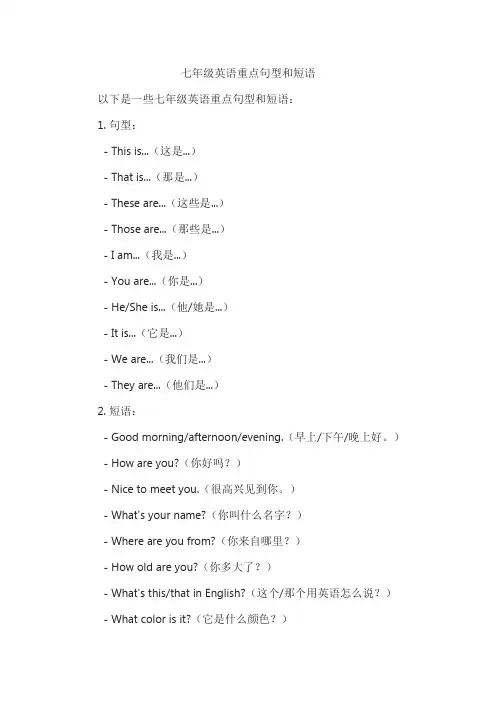
七年级英语重点句型和短语
以下是一些七年级英语重点句型和短语:
1. 句型:
- This is...(这是...)
- That is...(那是...)
- These are...(这些是...)
- Those are...(那些是...)
- I am...(我是...)
- You are...(你是...)
- He/She is...(他/她是...)
- It is...(它是...)
- We are...(我们是...)
- They are...(他们是...)
2. 短语:
- Good morning/afternoon/evening.(早上/下午/晚上好。
) - How are you?(你好吗?)
- Nice to meet you.(很高兴见到你。
)
- What's your name?(你叫什么名字?)
- Where are you from?(你来自哪里?)
- How old are you?(你多大了?)
- What's this/that in English?(这个/那个用英语怎么说?) - What color is it?(它是什么颜色?)
- What day is it today?(今天是星期几?)
- What's the weather like today?(今天天气怎么样?)
- Can you spell it, please?(请问你能拼写它吗?)
这些句型和短语是七年级英语学习的基础,掌握它们可以帮助学生更好地理解和运用英语。
当然,这只是其中的一部分,学生还需要不断学习和积累更多的英语知识。
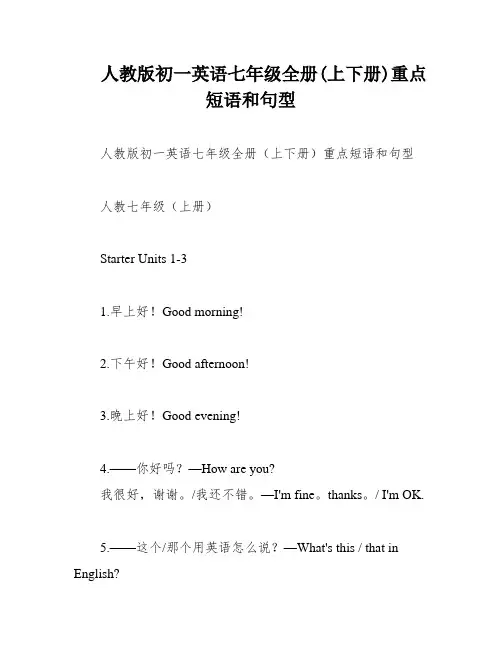
人教版初一英语七年级全册(上下册)重点短语和句型人教版初一英语七年级全册(上下册)重点短语和句型人教七年级(上册)Starter Units 1-31.早上好!Good morning!2.下午好!Good afternoon!3.晚上好!Good evening!4.——你好吗?—How are you?我很好,谢谢。
/我还不错。
—I'm fine。
thanks。
/ I'm OK.5.——这个/那个用英语怎么说?—What's this / that in English?是……—It's a / an。
6.请拼写它。
Spell it。
please.7.——它是什么颜色的?—What color is it? 它是……色的。
—It's。
Unit 1n A1.我是……I'm。
2.你是……吗?Are you。
3.他/她是……He / She is。
4.——见到你很高兴。
—Nice to meet you.见到你我也很高兴。
—Nice to meet you。
too.5.——你/他/她叫什么名字?—What's your / his / her name?我/他/她叫……—My / His / Her name is。
n B1.名字first name2.姓last name3.在中国in China4.学生卡ID card5.这是你的号码吗?Is this your number?6.——你的电话号码是多少?—What's your telephone / phone number?是……—It's。
Unit 2n A1.家庭照片family photos2.这是/那是/这些是/那些是……This is / That is / These are / Those are。
3.她/他是谁?Who's she / he?4.他们是谁?Who are they?5.祝你过得愉快!Have a good day!6.我知道了。
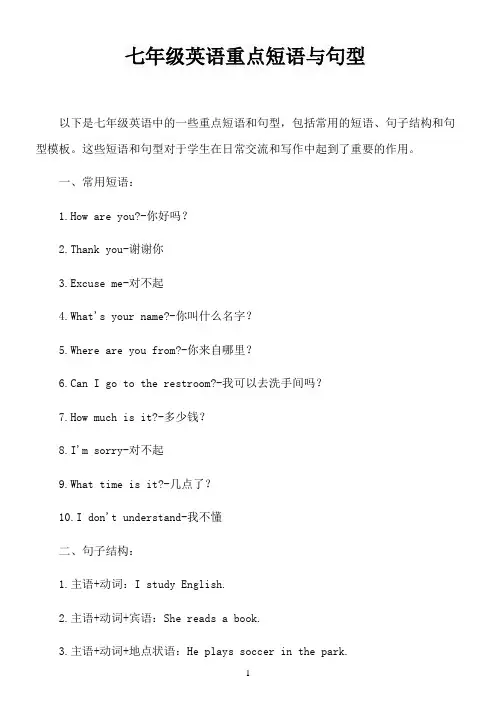
七年级英语重点短语与句型以下是七年级英语中的一些重点短语和句型,包括常用的短语、句子结构和句型模板。
这些短语和句型对于学生在日常交流和写作中起到了重要的作用。
一、常用短语:1.How are you?-你好吗?2.Thank you-谢谢你3.Excuse me-对不起4.What's your name?-你叫什么名字?5.Where are you from?-你来自哪里?6.Can I go to the restroom?-我可以去洗手间吗?7.How much is it?-多少钱?8.I'm sorry-对不起9.What time is it?-几点了?10.I don't understand-我不懂二、句子结构:1.主语+动词:I study English.2.主语+动词+宾语:She reads a book.3.主语+动词+地点状语:He plays soccer in the park.4.主语+动词+时间状语:We have class at 8 o'clock.5.主语+动词+宾语+地点状语:They eat dinner at home.三、句型模板:1.What+be+主语+like?-询问某人的外貌或性格特征。
Example:What is your sister like?-你妹妹长什么样?2.Can+主语+动词原形?-提出请求或询问能力。
Example:Can you help me?-你能帮我吗?3.How+be+主语?-询问某人的状态或感觉。
Example:How are you?-你好吗?4.What+do+主语+like?-询问某人的爱好或喜欢的事物。
Example:What does she like to do?-她喜欢做什么?5.Why+do/does+主语+动词原形?-询问原因或理由。
Example:Why do they go to the park?-他们为什么去公园?通过以上的短语和句型,学生可以在日常交流和写作中灵活运用。
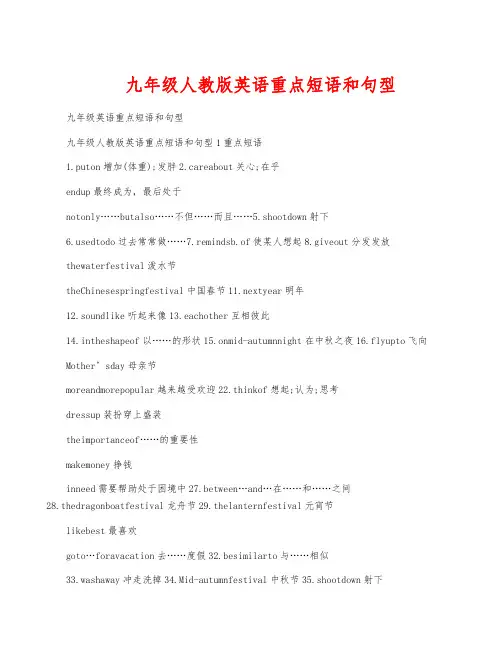
九年级人教版英语重点短语和句型九年级英语重点短语和句型九年级人教版英语重点短语和句型1重点短语1.puton增加(体重);发胖2.careabout关心;在乎endup最终成为,最后处于notonly……butalso……不但……而且……5.shootdown射下edtodo过去常常做……7.remindsb.of使某人想起8.giveout分发发放thewaterfestival泼水节theChinesespringfestival中国春节11.nextyear明年12.soundlike听起来像13.eachother互相彼此14.intheshapeof以……的形状15.onmid-autumnnight在中秋之夜16.flyupto飞向Mother’sday母亲节moreandmorepopular越来越受欢迎22.thinkof想起;认为;思考dressup装扮穿上盛装theimportanceof……的重要性makemoney挣钱inneed需要帮助处于困境中27.between…and…在……和……之间28.thedragonboatfestival龙舟节29.thelanternfestival元宵节likebest最喜欢goto…foravacation去……度假32.besimilarto与……相似33.washaway冲走洗掉34.Mid-autumnfestival中秋节35.shootdown射下callout大声呼喊thetraditionof……的传统38.atnight在夜里;在晚上one…,theother…一个……,另一个…...Father’sday父亲节重点句型Ithinkthatthey’refuntowatch.我认为它们看着很有意思。
Whatdoyoulikeabout…?WhatdoyoulikebestabouttheDragonBoatFestival?关于端午节,你最喜欢什么?Whatagreatday!多么美好的.一天!4.1wonderif…Iwonderifit’ssimilartotheWaterFestivaloftheDaipeopleinYunnanProvince.我想知道它是否与云南傣族的泼水节相似。
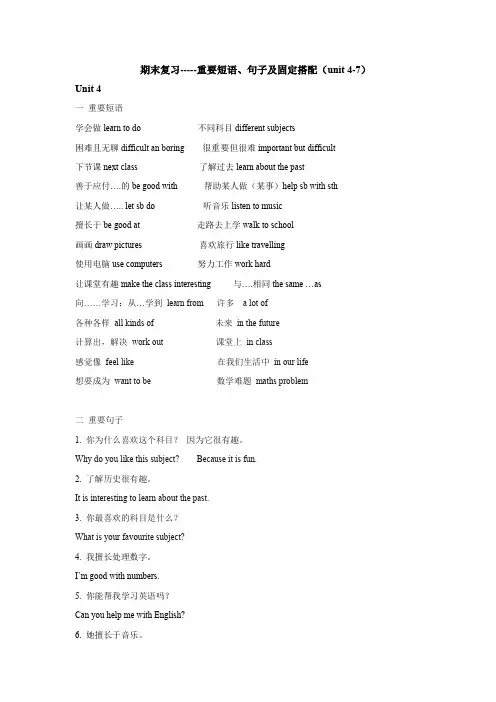
期末复习-----重要短语、句子及固定搭配(unit 4-7)Unit 4一重要短语学会做learn to do 不同科目different subjects困难且无聊difficult an boring 很重要但很难important but difficult下节课next class 了解过去learn about the past善于应付….的be good with 帮助某人做(某事)help sb with sth让某人做….. let sb do 听音乐listen to music擅长于be good at 走路去上学walk to school画画draw pictures 喜欢旅行like travelling使用电脑use computers 努力工作work hard让课堂有趣make the class interesting 与….相同the same …as向……学习:从…学到learn from 许多 a lot of各种各样all kinds of 未来in the future计算出,解决work out 课堂上in class感觉像feel like 在我们生活中in our life想要成为want to be 数学难题maths problem二重要句子1. 你为什么喜欢这个科目?因为它很有趣。
Why do you like this subject? Because it is fun.2. 了解历史很有趣。
It is interesting to learn about the past.3. 你最喜欢的科目是什么?What is your favourite subject?4. 我擅长处理数字。
I’m good with numbers.5. 你能帮我学习英语吗?Can you help me with English?6. 她擅长于音乐。
I am good with music.7. 学习使用电脑很有趣.It is fun to learn to use computer.8. 有时记住所有的信息很困难。
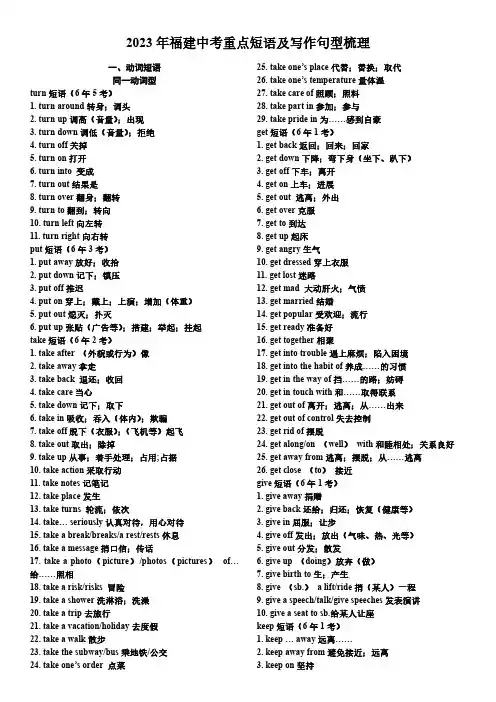
2023年福建中考重点短语及写作句型梳理一、动词短语同一动词型turn短语(6年5考)1.turn around转身;调头2.turn up调高(音量);出现3.turn down调低(音量);拒绝4.turn off关掉5.turn on打开6.turn into变成7.turn out结果是8.turn over翻身;翻转9.turn to翻到;转向10.turn left向左转11.turn right向右转put短语(6年3考)1.put away放好;收拾2.put down记下;镇压3.put off推迟4.put on穿上;戴上;上演;增加(体重)5.put out熄灭;扑灭6.put up张贴(广告等);搭建;举起;挂起take短语(6年2考)1.take after(外貌或行为)像2.take away拿走3.take back退还;收回4.take care当心5.take down记下;取下6.take in吸收;吞入(体内);欺骗7.take off脱下(衣服);(飞机等)起飞8.take out取出;除掉9.take up从事;着手处理;占用;占据10.take action采取行动11.take notes记笔记12.take place发生13.take turns轮流;依次14.take…seriously认真对待,用心对待15.take a break/breaks/a rest/rests休息16.take a message捎口信;传话17.take a photo(picture)/photos(pictures)of…给……照相18.take a risk/risks冒险19.take a shower洗淋浴;洗澡20.take a trip去旅行21.take a vacation/holiday去度假22.take a walk散步23.take the subway/bus乘地铁/公交24.take one’s order点菜25.take one’s place代替;替换;取代26.take one’s temperature量体温27.take care of照顾;照料28.take part in参加;参与29.take pride in为……感到自豪get短语(6年1考)1.get back返回;回来;回家2.get down下降;弯下身(坐下、趴下)3.get off下车;离开4.get on上车;进展5.get out逃离;外出6.get over克服7.get to到达8.get up起床9.get angry生气10.get dressed穿上衣服11.get lost迷路12.get mad大动肝火;气愤13.get married结婚14.get popular受欢迎;流行15.get ready准备好16.get together相聚17.get into trouble遇上麻烦;陷入困境18.get into the habit of养成……的习惯19.get in the way of挡……的路;妨碍20.get in touch with和……取得联系21.get out of离开;逃离;从……出来22.get out of control失去控制23.get rid of摆脱24.get along/on(well)with和睦相处;关系良好25.get away from逃离;摆脱;从……逃离26.get close(to)接近give短语(6年1考)1.give away捐赠2.give back还给;归还;恢复(健康等)3.give in屈服;让步4.give off发出;放出(气味、热、光等)5.give out分发;散发6.give up(doing)放弃(做)7.give birth to生;产生8.give(sb.)a lift/ride捎(某人)一程9.give a speech/talk/give speeches发表演讲10.give a seat to sb.给某人让座keep短语(6年1考)1.keep…away远离……2.keep away from避免接近;远离3.keep on坚持4.keep out不让……进入5.keep up with赶上;和……保持联系6.keep in touch with与……保持联系7.keep one’s cool沉住气;保持冷静8.keep an eye on留意;密切注视9.keep…to oneself保守秘密look短语(6年1考)1.look after照顾2.look around向四周看3.look at看4.look back回头看;回首;回忆;回顾5.look down向下看6.look down on/upon sb.看不起某人7.look for寻找8.look into向……里面看去;调查;研究9.look like看起来像10.look out留神;当心11.look over检查12.look through浏览13.look up查阅;抬头看14.look up to尊敬15.look forward to期待;盼望make短语(6年1考)1.make changes做出改变2.make dinner做晚饭3.make friends结交朋友4.make money赚钱5.make(a)noise制造噪声6.make progress取得进步7.make rules制定规则8.make soup做汤9.make tea泡茶10.make sure确保;查明11.make a call=make calls打电话12.make a choice=make choices做选择13.make a decision=make decisions做决定14.make a difference影响;有作用15.make a dish=make dishes做菜16.make(a)fire生火17.make a list列清单18.make a living谋生;维持生活19.make a mess弄得一团糟/一塌糊涂20.make a mistake=make mistakes犯错21.make a plan=make plans制定计划22.make a promise=make promises承诺23.make a speech=make speeches演讲24.make a wish=make wishes许愿25.make an effort做出努力26.make the/one’s bed铺床27.make one’s way前往;费力地前进28.make use of使用;利用29.make…feel at home使……感到宾至如归think短语(6年1考)1.think of认为;想起2.think up想出3.think about思考;思索4.think over仔细考虑5.think twice再三考虑agree短语1.agree with赞同某人;同意(说法/决定等)2.agree to同意某事/做某事3.agree on/about就……达成一致break短语1.break down发生故障2.break in闯入;打断3.break off突然终止;中断4.break out(战争、火灾等)突然发生;爆发5.break up粉碎;破碎call短语1.call(sb.)back(给某人)回电话2.call in召来;叫来3.call on号召;拜访4.call out呼唤;呼喊5.call up打电话给(某人);征召6.call the police报警7.call sb.at…拨……打给某人come短语e across(偶然)遇见/发现e back回来e from来自e in进来e out出来;出版e on来吧;赶快;加油e over顺便来访;过来e up出来;上升e up with想出(主意);提出;找出(答案)e into use开始使用e true(希望等)实现;达到e to one’s mind某人忽然想起cut短语1.cut down砍倒2.cut in插嘴;干预3.cut off切除4.cut out删除;删去;切断5.cut up切碎fall短语1.fall behind落后2.fall down突然倒下;跌倒;倒塌3.fall into掉进……里4.fall off从……掉下来5.fall asleep入睡6.fall ill患病;病倒7.fall in love with爱上……go短语1.go away走开2.go back回去3.go by(时间)逝去;经过4.go on继续5.go out出去;熄灭6.go over仔细检查;复习7.go through经历;翻阅;通过8.go abroad出国9.go boating去划船10.go camping去野营11.go fishing去钓鱼12.go shopping去购物13.go to bed去睡觉14.go to school去上学15.go to sleep开始睡觉;入睡16.go to the/a doctor去看医生17.go for a walk去散步18.go for a picnic=have a picnic去野餐19.go on a trip去旅行20.go on a vacation去度假21.go out of date过时have短语1.have breakfast/lunch/dinner吃早餐/午餐/晚餐2.have a fever/cold/cough/headache(患)发烧/感冒/咳嗽/头痛3.have a chance有机会4.have a look看一看5.have/hold a party举办派对6.have a picnic野餐7.have a point有道理8.have a try试一试;尝试一下lose短语1.lose control失控2.lose heart灰心;气馁3.lose weight减肥4.lose one’s life丧生5.lose one’s way迷路play短语1.play against同……比赛2.play with和……玩耍3.play chess下国际象棋4.play music演奏音乐5.play the erhu拉二胡6.play the guitar弹吉他7.play sports做运动8.play football/basketball踢足球/打篮球9.play computer games玩电脑游戏10.play a role/part in在……中起作用11.play a card game玩棋牌游戏12.play a joke on sb.开某人的玩笑run短语1.run after追逐;追赶2.run away逃跑;跑掉3.run into与……遇见;偶然相撞4.run away from逃离;逃避5.run out(of)用完;耗尽set短语1.set off动身;出发;使爆炸2.set out出发;启程3.set up创办;建立;设置4.set a goal设立目标stay短语1.stay out留在外面2.stay up熬夜3.stay with同……在一起4.stay away from与……保持距离5.stay calm保持镇定6.stay at home待在家里同一介词/副词型up短语(6年5考)1.break up粉碎;破碎2.bring up教育;培养;抚养3.call up打电话给(某人);征召4.cheer up使……振奋起来5.clean up打扫6.climb up攀登;升高7.cut up切碎8.dress up装扮;乔装打扮9.eat up吃光10.fix up修理;修补11.get up起床;站起12.give up放弃13.grow up成长;长大14.hang up挂断电话15.heat up使变热;给……加热16.hurry up赶快17.lift up举起;抬起18.light up照亮19.look up查阅;抬头看20.make up组成;编造;化妆21.mix up把……混合在一起22.pick up挑选;捡起;拿起;接(电话/某人)23.ring up打电话24.set up创办;建立;设置25.show up赶到;露面;出现26.speak up大点儿声说;大胆讲27.stand up起立28.stay up熬夜29.take up(尤指为消遣)学着做;开始做;占据(时间或空间)30.think up想出31.tidy up整理;收拾;归置32.turn up调高(音量);出现e up用完;耗尽34.wake up醒来35.warm up热身;做准备活动36.jump up and down跳起来;上蹿下跳away短语(6年3考)1.blow away吹走2.drive away驱车离开;赶走3.get away逃脱;离开4.give away捐赠;泄露5.move away搬走;离开6.pass away过世;逝世7.put away收起;收拾好8.run away逃跑;跑掉9.sweep away扫去10.take away夺去;拿走11.throw away扔掉12.walk away走开13.wash away冲走;洗掉down短语(6年2考)1.break down发生故障2.calm down平静下来;镇定下来3.close down(永久)关闭;关停4.cut down砍倒5.die down逐渐变弱;逐渐消失6.fall down突然倒下;跌倒;倒塌7.get down下降;弯下身(坐下、趴下)8.let…down使……失望9.look down向下看10.look down upon/on鄙视;看不起11.pass down传下来;遗传12.pull down拉下;摧毁13.shoot down射下;击落14.shut down停工;关闭15.sit down坐下16.slow down减速17.write down写下;记下about短语(6年1考)1.care about关心;在意plain about抱怨3.dream about梦想;梦到4.hear about听说;得知5.know about了解;知道6.learn about学习;了解7.talk about谈论;讨论;议论8.think about考虑9.worry about担心;烦恼of短语(6年1考)1.die from/of死于2.dream of梦想;梦见3.hear of听说e out of从……出来5.look out of往……外看6.get hold of抓住7.get out of逃避;从……出来8.remind sb.of sth.使某人想起某事9.think of认为;想起10.be made of由……制成/组成(可以看出原材料)11.take care of照顾;照料12.be made up of由……组成13.run out of用完;用尽off短语(6年1考)1.break off突然终止;中断2.clean off擦掉3.cool off冷静下来;(使)变凉4.cut off切除5.go off响;离开6.pay off还清(欠款等)7.put off推迟8.see…off为……送行9.set off动身;出发;使爆炸10.show off炫耀;卖弄11.shut off关闭;使停止运转12.start off出发;开始13.take off脱下(衣服);(飞机等)起飞14.turn off关掉on短语(6年1考)1.agree on就……达成一致2.carry on继续e on快点;赶快;加油4.depend on依赖;依靠;取决于5.fight on坚持;继续奋斗6.focus on致力于;使聚焦于7.get on取得进展;上车8.go on继续9.hold on等一等(别挂电话)10.keep on继续;重复11.knock on敲nd on着陆;登陆13.live on以……为食14.pass on传递15.turn on打开16.try on试穿17.work on从事;忙于at短语1.arrive at抵达ugh at嘲笑3.look at看4.knock at敲5.point at指着after短语1.look after照顾2.run after追逐;追赶3.take after(外貌或行为)像back短语1.bring back恢复;使想起;归还2.call(sb.)back(给某人)回电话3.hand back交还4.get back返回;恢复5.hold back隐瞒;退缩;阻止6.look back回顾;回头看7.pay back偿还(借款等)8.shout back喊回去9.take back退回;退还10.talk back回嘴;顶嘴by短语1.drop by顺便访问;随便进入2.go by(时间)逝去;经过3.pass/walk by路过;经过4.be made by由……制成(by后多接人)for短语1.ask for要;要求;请求2.call for要求;提倡;需要3.care for喜欢;关心;照顾4.cheer for为……加油5.die for为……而死6.fight for为……而战7.hope for盼望;希望(得到)8.leave for出发前往9.look for寻找;寻求10.pay for付……账;付买……的钱11.prepare for为……做准备12.search for搜寻;查找13.stand for代表;支持14.wait for等候;等待from短语1.borrow…from…从……借……e from/be from来自3.die from/of死于4.hear from收到……的来信5.learn…from…向……学习……6.protect…from保护……不受侵害7.keep…away from避免接近;远离8.run away from逃离;逃避9.prevent…from doing sth.阻止……做某事10.stop…from doing sth.阻止……做某事11.stay away from与……保持距离into短语1.change…into…将……变为……2.fall/drop into落入;陷入3.divide into把……分成4.knock into与……相撞5.look into调查;研究6.rush into冲入7.translate into翻译成……in短语1.arrive in到达2.believe in信任;信赖3.break in闯入;打断4.call in召来;叫来e in进来6.cut in插嘴;干预7.fill in填补;填写8.give in屈服;让步9.hand in上交;提交;呈送10.join in/take part in参加11.take in接收;吞入(体内);欺骗out短语1.blow out吹灭2.break out(战争、火灾等)突然发生;爆发3.bring out使显现;出版;生产4.call out呼唤5.check out核实;结账6.clean out清除;把……打扫干净7.clear out清理;丢掉8.cry out呐喊;呼喊9.cut out删除;删去;切断10.die out灭绝;消失11.eat out出去吃饭12.figure out算出13.find out查明;发现;了解14.hand out分发;发放15.hang out闲荡;闲逛16.help out帮助……摆脱困难y out摆弄;布置18.leave out忽略;不提及;不包括19.look out当心;注意;向外看20.point out指出21.put out扑灭;熄灭22.reach out伸出23.sell out卖光24.send out发送;派遣25.set out出发;启程26.take out取出27.try out试验;试用;尝试28.work out解决;算出over短语e over顺便来访;过来2.get over克服3.go over仔细检查;复习4.look over检查5.take over接收;接管6.think over仔细考虑7.turn over翻身;翻转8.run over to跑到to短语1.add to sth.增加某物2.belong to sb.属于某人3.dance to music伴着音乐跳舞4.listen to听……5.lead to导致;通向6.point to指向(远处)7.stick to doing sth.坚持做某事8.shout to/at对……大声喊叫9.speak to sb.对某人说话10.talk to sb.跟某人说11.write to sb.给某人写信pare…to…把……比作;把……比喻为13.express…to…向……表达……14.lend…to…把……借给……15.spread…to…向……传播……16.help oneself to请随便吃/喝……17.hold on to继续;坚持;保持18.live up to活到19.say sorry/goodbye to sb.向某人道歉/道别20.look forward to(doing)sth.期待(做)某事with短语1.agree with sb.赞同某人;与某人持相同意见2.argue with sb.与某人争吵3.begin with/start with以……开始municate with sb.和某人交流pare…with…把……和……做比较6.connect with连接;与……联系7.deal with处理;应付(与how连用)8.do with处理(与what连用)9.fight with与……打架10.fill with装满;充满11.part with放弃、交出(尤指不舍得的东西)12.play with玩耍;和……玩13.provide…with…提供……给……14.share…with…与……分享15.stay with sb.和某人待在一起16.talk with sb.与某人交谈17.catch up with赶上e up with提出;想出19.end up with以……结束20.have to do with关于……;与……有关21.fall in love with爱上……22.get along/on(well)with与……和睦相处/关系良好23.make friends with与……交朋友其他常见动词短语(6年2考)1.enjoy oneself=have a good/great/wonderful time=have fun过得愉快;玩得开心2.feel like想;想要3.fight against反对;对抗4.leave…alone不打扰;不管5.leave…behind把……遗留下来6.move forward前进7.pull together齐心协力;通力合作8.work together合作9.raise money筹钱10.regard…as…把……当作……11.do harm to对……有危害12.do researches做调研13.drive sb.mad使某人发狂14.attend a meeting参加会议15.catch a bus赶公共汽车16.climb a mountain爬山17.learn a lesson吸取教训18.read a book=read books读书19.ride a bike骑自行车20.see a dentist看牙医21.win a prize得奖22.win a competition赢得比赛23.pay a visit to参观24.go for a picnic野餐25.get into a fight with和……吵架26.have a better understanding of更好地理解……27.change one’s mind/idea改变主意28.hold one’s breath屏住呼吸29.open one’s heart to对……敞开心扉30.raise one’s voice提高嗓门31.reach one’s goal实现某人的目标32.raise one’s hand举手33.risk one’s life某人冒生命危险34.clean the room打扫房间35.follow the rules遵守规则36.jump out of跳出……37.rush out of冲出……38.solve the problem解决问题二、形容词短语be+adj.+with(6年3考)1.be angry with…生……的气2.be born with…天生具有……3.be busy with…忙于……4.be careful with小心(对待)……5.be covered with…被……所覆盖6.be familiar with…熟悉……7.be filled with…充满……8.be good with…善于应付……9.be patient with…对……有耐心10.be pleased with…对……感到满意11.be popular with…受……欢迎12.be satisfied with…对……满意13.be strict with sb.对某人要求严格be+adj.+for(6年1考)1.be famous/known/well-known for+原因因……而著名2.be good/bad for…对……有益/有害3.be late for………迟到4.be necessary for…对……有必要5.be/get ready for…为……做好准备6.be responsible for…对……负责7.be sorry for…对……感到遗憾/抱歉8.be thirsty for…渴望;渴求……be+adj.+in(6年1考)1.be born in出生于……2.be busy(in)doing sth忙于做某事3.be confident in…对……有信心4.be disappointed in/with sb.对某人感到失望5.be/become interested in…对……感兴趣6.be rich in…富含……;盛产……7.be strict in(doing)sth.对(做)某事要求严格8.be successful in…在……成功9.be talented in…在……方面有天赋10.be weak in…在……方面薄弱be+adj.+of(6年1考)1.be afraid of(doing)…害怕(做)……2.be careful of…小心/注意……3.be sure of…对……有把握4.be fond of(doing)…喜欢(做)……5.be full of…充满……6.be proud of…为……骄傲;感到自豪7.be short of…缺乏……8.be tired of(doing)…厌倦(做)……be+adj.+to(6年1考)1.be close to…靠近……2.be famous/known/well-knownto+对象为……所熟知3.be friendly/kind/nice to…对……友好4.be harmful to…对……有害5.be polite to…对……有礼貌6.be related to…与……有关7.be rude to…对……粗鲁8.be similar to…与……类似9.be thankful to…感激……10.be used to doing…习惯于……11.be willing to乐意……12.be useful to对……有用be+adj.+at(6年1考)1.be amazed at…对……感到惊讶2.be angry at/about sth.因某事/某物而生气3.be mad at sb.生某人的气4.be good/bad at…擅长/不擅长……5.be surprised at…对……感到吃惊be+adj.+about(6年1考)1.be careful about…对……谨慎2.be crazy about…对……着迷3.be excited about…对……感到兴奋4.be nervous about…因……而紧张5.be pleased about…因……感到高兴6.be sad about…为……而难过7.be serious about…对……是认真的8.be sorry about…对……感到抱歉9.be sure about…对……有把握10.be worried about…对……感到担忧be+adj.+from1.be absent from…缺席……2.be different from…与……不同3.be far(away)from…距……远三、副词短语与时间有关1.just now刚才2.right now马上3.right away立刻4.hardly ever几乎从不5.so far到目前为止;迄今为止6.now and then不时;有时7.once in a while偶尔;有时8.once or twice偶尔;一两次9.sooner or later迟早10.day and night日日夜夜11.the other day前几日12.the day after tomorrow后天13.the day before yesterday前天14.once upon a time从前15.all year round全年其他1.above all首要的是;尤其2.after all毕竟;终归3.as well as和……一样4.as well也;此外5.much too太6.no longer/not any longer不再7.no wonder难怪;怪不得8.not…at all一点儿也不9.again and again反复地10.and so on等等11.one after another一个接一个12.once again再次;再度13.over and over again多次;反复地14.over there在那里15.here and there到处16.up and down上上下下四、介词短语in短语(6年7考)1.in agreement达成一致2.in all/total总之;共计3.in common共同;共有4.in danger处于危险中5.in fact事实上6.in general总体而言7.in need在危难中;在困境中8.in order井然有序9.in pain痛苦地10.in peace和平地11.in person亲自;亲身12.in public公开地13.in return作为回报14.in space在太空15.in silence沉默地16.in surprise惊奇地17.in time及时18.in trouble处于困境中19.in case of万一20.in control of掌管;管理21.in the face of面临(问题、困难等)22.in front of在……前面(外部)23.in the front of在……前面(内部)24.in need of需要;缺少25.in search of寻找26.in order to为了;以便27.in the middle of在……中间28.in a hurry匆忙地29.in a word总而言之;简言之30.in a low voice低声地31.in that case既然那样;假使那样的话32.in the distance在远处33.in the end最后34.in the future在将来35.in the way挡道;妨碍36.in good health健康状况良好37.in one’s opinion在某人看来38.in other words换句话说;换言之to短语(6年2考)1.according to根据;按照;据……所说;视……而定2.close to接近3.next to紧靠……的旁边;贴近;最接近4.thanks to多亏;由于5.to be honest老实说6.to one’s surprise使某人吃惊的是7.to start with起初;开始时at短语(6年1考)1.at birth出生时2.at first起初3.at home在家4.at last最后5.at least至少6.at most最多7.at night在晚上8.at once马上9.at present目前;现在10.at school在上学;在学校11.at times有时;偶尔12.at work在工作13.at weekends/the weekend在周末14.at a time每次;一次15.at that time那时候16.at the same time同时;一起17.at the moment此时;现在18.at that moment在那时19.at the age of在……岁时20.at the beginning of在……开始时21.at the end of在……结尾22.at the bottom of在……底部23.at the foot of在……底部;在……脚下24.at the top of在……顶部或顶端of短语(6年1考)1.ahead of在……之前;提前2.because of因为;由于3.instead of代替;而不是4.first of all首先5.all of a sudden突然;猛地on短语(6年1考)1.on business出差2.on duty值日;值班3.on foot步行4.on fire着火5.on hand在手边6.on sale廉价销售;出售7.on show展出;在上映8.on time准时9.on vacation在度假10.on weekends/the weekend在周末11.on one’s own独自12.on the/one’s way to…在某人去……的路上13.on the Internet在网上14.on the left在左边15.on the right在右边16.on the one hand…on the other hand…一方面……另一方面……by短语1.by air乘飞机2.by bike骑自行车3.by bus乘公共汽车4.by car乘小汽车5.by plane乘飞机6.by ship乘船7.by subway乘地铁8.by taxi乘出租车9.by train乘火车10.by accident/chance偶然;意外地11.by hand手工12.by heart凭记忆;能背诵13.by mistake错误地;无意中14.by oneself独自地15.by turns轮流16.by the time…到……时候17.by the way顺便说一下;顺便问一下18.by the end of…到……结束时from短语1.across from在……对面2.from…to…从……到……3.from now on从今/此以后;今后4.from then on从那时起5.from time to time时常;有时其他常见介词短语(6年1考)1.after all毕竟2.along with连同;除……以外还3.as for至于4.as usual像往常一样5.for example/such as例如6.for sale待售7.for sure无疑;肯定8.less than少于9.more than多于10.thanks for…因……而感谢11.without doubt毫无疑问12.all in all总的来说13.all over/around the world全世界14.as a result结果15.be up to是……的职责;由……决定16.be out of work失业17.be used for被用作……五、以名词为核心的短语help(6年1考)1.call for help请求帮助2.ask sb.for help向某人寻求帮助3.with one’s help=with the help of sb.在某人的帮助下attention1.get(one’s)attention得到(某人)关注2.pay attention to…对……注意;留心……3.draw one’s attention吸引某人的注意力breath1.hold one’s breath屏气2.take a deep breath深呼吸3.in one breath一口气;同时4.out of breath喘不过气chance1.by chance偶然;意外地2.have/get a chance有机会;有希望3.take a chance冒险control1.take control of控制;掌控2.be in control of控制3.be out of control失控4.under control处于控制之下doubt1.no doubt无疑;很可能2.without doubt毫无疑问dream1.make one’s dream come true让某人梦想成真2.achieve/realize one’s dream实现某人的梦想end1.in the end最后2.by the end of到……结束时3.at the end of…在……结尾hand1.at hand在手边;在附近2.put up/raise one’s hand举手3.shake hands with sb.与某人握手4.give sb.a hand帮助某人5.by hand手工heart1.lose heart灰心;气馁2.from the bottom of one’s heart发自内心的;从某人心底3.by heart用心interest1.have no interest in…对……不感兴趣2.develop one’s interest in培养某人的兴趣3.show an interest in…对……表现出兴趣mind1.make up one’s mind下定决心2.keep in mind记住3.change one’s mind改变心意need1.in need在危难中;在困境中2.in need of需要;缺少3.meet one’s need满足某人的需要order1.take one’s order点菜2.keep sth.in order使某物井然有序3.in order按顺序4.in order to为了;以便place1.take place发生2.in place适当;适当的;在适当的地方;在恰当的位置3.take one’s place=take the place of sb.代替;替换4.put yourself in one’s place设身处地为他人着想5.a good place to…一个……的好地方promise1.make a promise许诺;允诺2.break the promise违反诺言3.keep one’s promise遵守诺言rule1.break the rule违反规则2.follow/obey the rule遵守规则3.make a rule/rules制定规则surprise1.in surprise惊奇地2.to one’s surprise使某人吃惊的是3.get a surprise吃惊time1.at times有时;偶尔2.on time按时3.all the time一直;始终4.by the time…到……时候5.at that time那时候6.from time to time时常;有时7.at the same time同时;一起8.take one’s time从容不迫;不着急9.spare time to do sth.腾出时间做某事10.spend time on sth./(in)doing sth.花费时间做某事way1.on the/one’s way to…在某人去……的路上2.make one’s way前往;费力地前进3.get in the way of…挡……的路;妨碍4.lose one’s way迷路word1.in a word总而言之;简言之2.in other words换句话说;换言之3.keep one’s word遵守承诺重点句型不定式(含省to不定式)常用句型1.find/think/feel it+adj.+to do sth.发现/认为/感到做某事是……2.prefer to do sth.rather than do sth.宁愿做某事而不愿做某事3.adj./adv.+enough to do sth.足够……做某事4.too+adj./adv.+to do sth.太……而不能做某事5.It’s+adj.(+for/of sb.)+to do sth.(对于某人而言)做某事是……/(某人)做某事是……6.It’s one’s turn to do sth.轮到某人做某事。
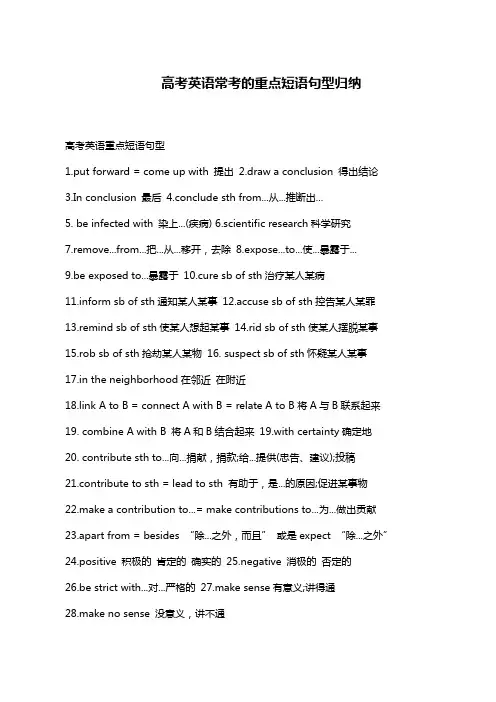
高考英语常考的重点短语句型归纳高考英语重点短语句型1.put forward = come up with 提出2.draw a conclusion 得出结论3.In conclusion 最后4.conclude sth from...从...推断出...5. be infected with 染上...(疾病)6.scientific research科学研究7.remove...from...把...从...移开,去除8.expose...to...使...暴露于...9.be exposed to...暴露于10.cure sb of sth治疗某人某病rm sb of sth通知某人某事12.accuse sb of sth控告某人某罪13.remind sb of sth使某人想起某事14.rid sb of sth使某人摆脱某事15.rob sb of sth抢劫某人某物16. suspect sb of sth怀疑某人某事17.in the neighborhood在邻近在附近18.link A to B = connect A with B = relate A to B将A与B联系起来19. combine A with B 将A和B结合起来19.with certainty确定地20. contribute sth to...向...捐献,捐款;给...提供(忠告、建议);投稿21.contribute to sth = lead to sth 有助于,是...的原因;促进某事物22.make a contribution to...= make contributions to...为...做出贡献23.apart from = besides “除...之外,而且”或是expect “除...之外”24.positive 积极的肯定的确实的25.negative 消极的否定的26.be strict with...对...严格的27.make sense有意义;讲得通28.make no sense 没意义,讲不通高中英语必背重点句子有哪些1.allow sb to do sth 允许某人去做某事(后接动词不定式)My father allowed me to go out for a walk after finishing my homework.2.asked sb (not) to do sth 叫某人做事某事(叫某人不要去做某事)My father asked me to study hard.He asked me not to swim alone.be asked to do sth 被叫去做某事/被邀请去做某事I was asked to have a dinner with them yesterday.3.be afraid to do sth 害怕做某事She is afraid to ask me questions.4.be afaid of doing sth 害怕做某事I am afraid of going out at night.5.be afaid of sth 害怕某物He is afraid of snakes.6.be amazed to do sth 对做某事感到惊讶He was amazed to meet the girl there.be amazed at sth 对某事感到惊讶they were amazed at the news.高中英语必背重点句子1. According to…依照/根据…….According to the newspaper, it#39;s a great movie. 根据报纸说,这是一部很棒的电影.2. Am I allowed to…我可以……吗Am I allowed to introduce our new manager Mr. Anderson to all of you请允许我介绍我们的新经理安德森先生给大家,好吗3. As matter of fact,…实际上……,…….As matter of fact,I don#39;t agree with you. 实际上,我不大同意你的看法.4.As far as I#39;m concerned/…就我而言,…….As far as I#39;m concerned, | think we should pay more attention to the safety of schoolchildren.就我而言,我认为我们应该更关注在校儿童的安全问题.5.As far as I know,...据我所知,…….As far as l know,he is not coming,but l may be wrong.据我所知,他不打算来,但我或许会弄错.6.As I just mentioned...正如我刚才提到过的,…….As I just mentioned, nobody should drop out of school unless they believe they face theopportunity of a lifetime. And even then they should reconsider.正如我刚才提到过的,任何人都不应该辍学,除非他们相信他们面临着一生中难得的机会,尽管那样,他们还需反复思量. [reconsider..重新考虑]7. As I see it,…在我看来,…….As I see it, he is not the right person for this position. 在我看来,他不是这个职位的合适人选.8. As is known to us all, ... 众所周知,……As is known to us all, Hong Kong is one of the financial centers of Asia.众所周知,香港是亚洲金融中心之一.9. As long as...只要….As long as we work together, we can make the impossible possible.只要我们一起努力,我们就能把不可能变为可能.10.But for...若不是因为……./如果没有…….But for your generous help, we couldn#39;t have finished the work so soon. 如果没有你的鼎力相助,我们不可能这么快完成工作的.。
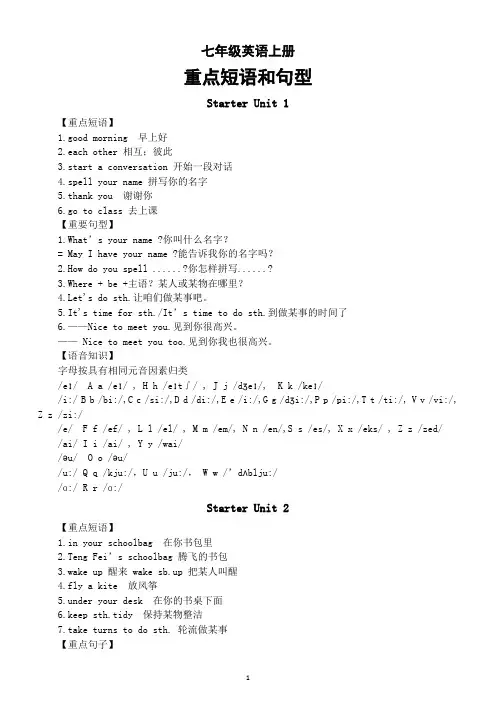
七年级英语上册重点短语和句型Starter Unit 1【重点短语】1.good morning 早上好2.each other 相互;彼此3.start a conversation 开始一段对话4.spell your name 拼写你的名字5.thank you 谢谢你6.go to class 去上课【重要句型】1.What’s your name ?你叫什么名字?= May I have your name ?能告诉我你的名字吗?2.How do you spell ......?你怎样拼写......?3.Where + be +主语?某人或某物在哪里?4.Let's do sth.让咱们做某事吧。
5.It's time for sth./It’s time to do sth.到做某事的时间了6.——Nice to meet you.见到你很高兴。
—— Nice to meet you too.见到你我也很高兴。
【语音知识】字母按具有相同元音因素归类/eɪ/ A a /eɪ/ , H h /eɪt∫/ , J j /dʒeɪ/, K k /keɪ//i:/ B b /bi:/,C c /si:/,D d /di:/,E e /i:/,G g /dʒi:/,P p /pi:/,T t /ti:/, V v /vi:/, Z z /zi://e/ F f /ef/ , L l /el/ , M m /em/, N n /en/,S s /es/, X x /eks/ , Z z /zed/ /ai/ I i /ai/ , Y y /wai//əu/ O o /əu//u:/ Q q /kju:/,U u /ju:/,W w /’dʌblju://ɑ:/ R r /ɑ:/Starter Unit 2【重点短语】1.in your schoolbag 在你书包里2.Teng Fei’s schoolbag 腾飞的书包3.wake up 醒来 wake sb.up 把某人叫醒4.fly a kite 放风筝5.under your desk 在你的书桌下面6.keep sth.tidy 保持某物整洁7.take turns to do sth. 轮流做某事【重点句子】1.——What do you have in your schoolbag ?你的书包里有什么?—— I have a cap .我有一顶帽子。
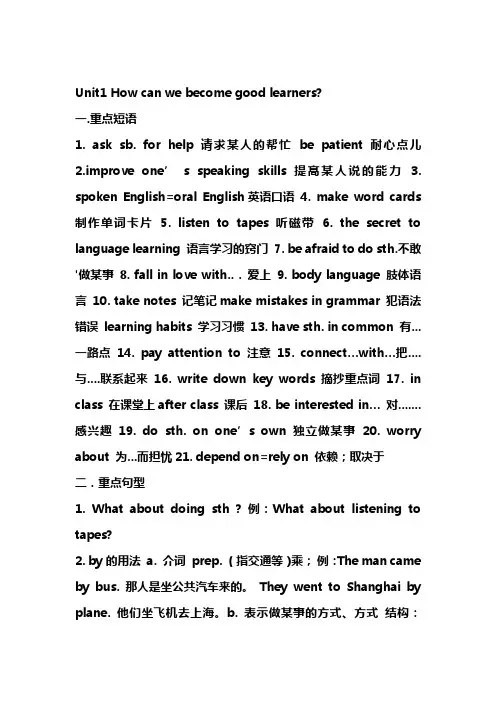
Unit1 How can we become good learners?一.重点短语1. ask sb. for help 请求某人的帮忙be patient 耐心点儿2.improve one’ s speaking skills 提髙某人说的能力3. spoken English=oral English英语口语4. make word cards 制作单词卡片5. listen to tapes 听磁带6. the secret to language learning 语言学习的窍门7. be afraid to do sth.不敢'做某事8. fall in love with.. . 爱上9. body language 肢体语言10. take notes 记笔记make mistakes in grammar 犯语法错误learning habits 学习习惯13. have sth. in common 有...一路点14. pay attention to 注意15. connect…with…把....与....联系起来16. write down key words 摘抄重点词17. in class 在课堂上after class 课后18. be interested in… 对.......感兴趣19. do sth. on one’s own 独立做某事20. worry about 为...而担忧21. depend on=rely on 依赖;取决于二.重点句型1. What about doing sth ? 例:What about listening to tapes?2. by的用法a. 介词prep. (指交通等)乘;例:The man came by bus. 那人是坐公共汽车来的。
They went to Shanghai by plane. 他们坐飞机去上海。
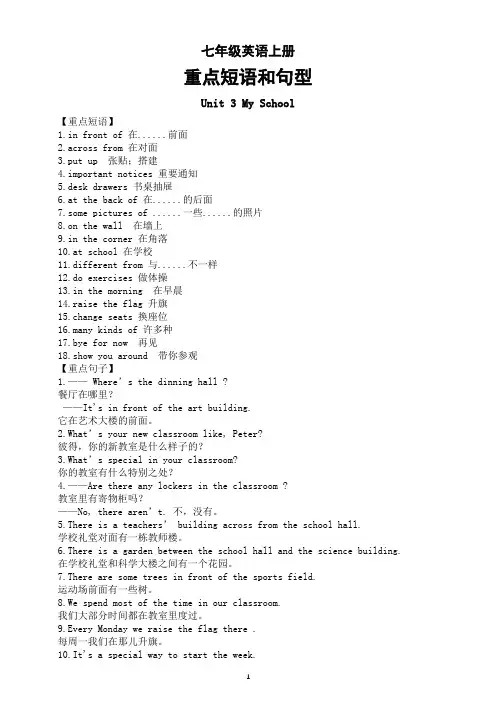
七年级英语上册重点短语和句型Unit 3 My School【重点短语】1.in front of 在......前面2.across from 在对面3.put up 张贴;搭建4.important notices 重要通知5.desk drawers 书桌抽屉6.at the back of 在......的后面7.some pictures of ......一些......的照片8.on the wall 在墙上9.in the corner 在角落10.at school 在学校11.different from 与......不一样12.do exercises 做体操13.in the morning 在早晨14.raise the flag 升旗15.change seats 换座位16.many kinds of 许多种17.bye for now 再见18.show you around 带你参观【重点句子】1.—— Where’s the dinning hall ?餐厅在哪里?——It's in front of the art building.它在艺术大楼的前面。
2.What’s your new classroom like, Peter?彼得,你的新教室是什么样子的?3.What’s special in your classroom?你的教室有什么特别之处?4.——Are there any lockers in the classroom ?教室里有寄物柜吗?——No, there aren’t. 不,没有。
5.There is a teachers’ building across from the school hall.学校礼堂对面有一栋教师楼。
6.There is a garden between the school hall and the science building. 在学校礼堂和科学大楼之间有一个花园。
2000(一)加-ingenjoy / like doing sth 喜欢做---- spend....(in) doing sth 在做---花费---try doing 试着做------ be busy doing sth 忙于做------finish doing sth 完成做---- look forward to + doing sth 期待做----(现在进行时) be doing 正在做--- Thank you for (doing) sth 为了--感谢你(二)加-todecide to do sth 决定去做----- ask (sb)to do 要求(某人)去做----It’s+adj +to do sth . 做---(怎么样) would like / want to do 想要做-----It takes sb sometime to do sth在做----花费----(三)加原形let / make sb do sth 让某人做某事be going to / will do sth (一般将来时态)(四)加-to 或-ing意思不同forget doing 忘记做过了-----(已做) remember doing记得做过了-----(已做) forget to do 忘记去做------(还没做) remember to do记得去做------(还没做)(五)加-to 或-ing意思相同begin / start to do sth = begin / start doing sth开始做------(六) (A)动词+ 介词agree with同意....的意见(想法);符合help ... with ...帮助(某人)做(某事) listen to听... get to到达.... fall off (从......)掉下base on以....(为)根据knock at /on敲(门、窗) laugh at嘲笑learn.. from 向...学习live on继续存在;靠...生活look after照顾,照看look at看;观看look for寻找look like看起来像pay for (sth.)付钱;支付point at指示;指向point to指向....prefer to ...宁愿(选择);更喜欢quarrel with (和某人)吵架regard...as ...把....当作....;当作stop...from阻止.....做.....talk about说话;谈话;谈论talk with与......交谈think about考虑think of认为;想起B)动词+ 副词ask for请求;询问carry on坚持下去;继续下去cut down砍倒clean up清除;收拾干净come down下来;落come along来;随同come in进来come on来吧;跟着来;赶快come over过来;顺便来访come out出来;出现;(花)开;发(芽)drop off放下(某物);下车eat up吃光;吃完fall behind落在......后面;输给别人fall down跌倒;从......落下find out查出(真相) get back回来;取回get down下来;落下;把......取下来get off下来;从......下来get on上(车) get up起床give up放弃go on继续go out出去go over过一遍;仔细检查grow up长大;成长hand in交上来hurry up赶快hold on (口语)等一等;(打电话时)不挂断look out留神;注意look over (仔细)检查look up向上看;抬头看pass on传递;转移到.... pick up拾起;捡起put away放好;把....收起来put on穿上;戴上;(戏剧等)上演;放(唱片)等put down把(某物)放下来put up挂起;举起run away流失;逃跑;逃走rush out冲出去set off出发;动身;启程send up发射;把......往上送shut down把......关上sit down坐下slow down减缓;减速take off脱掉(衣服)take out取出throw about乱丢;抛撒trip over (被......)绊倒try on试穿(衣服、鞋等);试戴(帽子等) try out试验;尝试turn down关小;调低turn on打开(电灯、收音机、煤气、自来水)等turn off关(电灯、收音机、煤气、自来水等) turn over (使)翻过来wake up醒来wear out把......穿旧;磨坏work out算出;制订出write down写下....C) be + 形容词+ 介词be angry with对(某人)发脾气be interested in对......感兴趣be able to能;会be afraid of害怕be amazed at对......感到惊讶be excited about对......感到兴奋be filled with用......充满be full of充满......的be good at =do well in在....方面做得好;善于be late for迟到be made in在......生产或制造be made of由....组成;由....be pleased with对......感到满意be proud of以......自豪/高兴be used for用于D)动词+ 名词/ 代词beg one´s pardon请原谅;对不起do morning exercises做早操do one´s homework做作业enjoy oneself =have a good time过得快乐;玩得愉快give a concert开音乐会go boating去划船go fishing去钓鱼go hiking去徒步旅行go skating去滑冰go shopping (去)买东西have a cold (患)感冒have a cough (患)咳嗽have a headache (患)头痛have a try尝试;努力have a look看一看have a rest休息have a seat (= take a seat ) 就坐;坐下have sports进行体育活动have supper吃晚餐hear of听说hold a sports meeting举行运动会make a decision作出决定make a mistake犯错误make a noise吵闹make faces做鬼脸make friends交朋友make money赚钱take one´s place坐某人的座位;代替某人的职务teach oneself (=learn by oneself ) 自学watch TV看电视take photos照相take time花费(时间) take turns轮流E)动词+ 名词/ 代词/ 副词+ 介词catch up with赶上come up with找到;提出(答案、解决办法等)get on well with与......相处融洽give birth to生(孩子)help yourself / yourselves to自取;随便吃make room for给.....腾出地方play a joke on戏弄人;对人恶作剧speak highly of称赞say good bye to告别;告辞take an active part in积极参加take care of照顾;照料;注意F)其他类型be awake醒着的be born出生be busy doing忙着做come true实现do one´s best尽最大努力fall asleep睡觉;入睡go home回家go on doing (sth.)继续做某事;尽力get married结婚get together相聚go straight along 沿着...一直往前走had better (do)最好(做...) keep doing sth.一直做某事make sure确保;确认;查明make up one´s mind下决心1 (see 、hear 、notice 、find 、feel 、listen to 、look at 感官动词)+do eg:I like watching monkeys jump2 (比较级and 比较级)表示越来越怎么样3 a piece of cake =easy 小菜一碟(容易)4 agree with sb 赞成某人5 all kinds of 各种各样a kind of 一样6 all over the world = the whole world 整个世界7 along with同…一道,伴随…eg : I will go along with you我将和你一起去The students planted trees along with their teachers.学生同老师们一起种树8 as soon as 一怎么样就怎么样9 as you can see 你是知道的10 ask for ……求助向…要…(直接接想要的东西)eg : ask you for my book11 ask sb for sth 向某人要什么12 ask sb to do sth 询问某人某事ask sb not to do 叫某人不要做某事13 at the age of 在……岁时eg:I am sixteen.=I am at the age of sixteen.14 at the beginning of …………的起初;……的开始15 at the end of +地点/+时间最后;尽头;末尾eg : At the end of the day.16 at this time of year 在每年的这个时候17 be /feel confident of sth /that clause +从句感觉/对什么有信心,自信eg : I am / feel confident of my spoken English.I feel that I can pass the test.18. be + doing 表:1 现在进行时2 将来时I am watching now. I am going to the zoo tomorrow.19 be able to (+ v 原) = can (+ v 原)能够……eg : She is able to sing She can sing20 be able to do sth 能够干什么eg :She is able to sing.21 be afraid to do /of sth 恐惧,害怕……eg : I'm afraid to go out at night. I'm afraid of dog.22 be allowed to do 被允许做什么eg: I'm allowed to watch TV.我被允许看电视。
中考英语常考的重点句型及短语汇总一、重点句型1.So + be/助动词/情态动词/主语.前面陈述的肯定情况也适于另一人(物)时,常用到这种倒装结构,表示“另一人(物)也如此。
”前面陈述的否定情况也适于另一人(物)时,常用“Neither/ Nor + be/助动词/情态动词+主语.”这种倒装结构。
注意:“So+主语+be/助动词/情态动词.”这一句型常用于表示赞同,进一步肯定对方的看法,表示“的确如此。
”“是呀。
”2.Turn right/leftat the first/second/…crossing.这一指路的句型意为“在第一/二/……个十字路口向右/左拐。
”相当于Take the first /second/…turning on theright/left.3.It takes sb.some time to do sth.此句型表示“干某事花了某人一段时间。
”其中的it是形式主语,后面的动词不定式(短语)才是真正的主语.4.…think/find + it + adj. + to do sth.此句型中的it是形式宾语,不可用其它代词替代,形容词作宾语的补足语,后面的动词不定式(短语)才是真正的宾语。
5.What’s wrong with…?此句型相当于What’s the matter/ trouble with…?后跟某物作宾语时,意为“某物出什么毛病了?”后跟某人作宾语时,意为“某人怎么了?”6.too…to…在so…that…复合句中,that后的句子是否定句时,常与简单句too…to…(太……而不能……)进行句型转换。
在so…that…复合句中,that后的句子是肯定句时,常与简单句…enough to…进行句型转换.7.Sorry to hear that.全句应为I’m sorry to hear that. 意为“听到此事我很难过(遗憾)。
”常用于对别人的不幸表示同情、遗憾之意。
高中英语单词·短语·句型归纳高中英语单词·短语·句型归纳以下是店铺整理出的高中英语重点单词短语及句型归纳,欢迎参考,喜欢可以收藏!重点单词和短语1、add up合计add up to…共计, 总计达add…to把…加在里面add to 增加 add to the beauty2、upset sb. 某人不安 upset oneself about sth. 为某事而烦恼be upset at/about 因…而烦恼3、ignore sb./sth. 忽视,不理会 be ignorant of 对… 无知,不了解ignorant adj 无知的,愚昧的 ignorance n 无知.愚昧4、calm vt.&vi. (使)平静;(使)镇定calm down 镇静, 平静calm sb. down 使某人镇静adj. 平静的';镇定的keep calm 保持镇静calm/silent/quiet/still 辨析5、concern vt. 使担忧;涉及;关系到 n. 担心;关注with concern 关切地 show (no) concern for/about sb. 对某人(不)关心, concern oneself with/ in 参与,干涉be concerned with 与… 有关系be concerned about/ for sth. /that-clause 为…担心,挂念 a concerned look 担心的表情As far as… be concerned 就某某而言concerning prep. 关于,有关6、walk the dog 遛狗7、go through 经历, 经受go through a hard time 经历了一段困难时期go through the baggage 检查行李go through the newspaper 浏览报纸 go through lots of money 花了很多钱8、set down. 记下,放下set down the ideas on paper 把想法写在纸上set me down at the bus-stop 在车站让我下车set out/set off/set about/up/aside的意思及用法9、a series of 一系列的, 一连串的 a series of books 丛书a series of stamps 一套邮票 a series of pictures 连环画10、on purpose 故意地= by design= deliberately by chance/accident=accidentallylie to sb. on purpose 故意向某人撒谎 on purpose to do sth. 为了…而特地go there on purpose to see sb. 特意到那里去看某人for/with the purpose of 为了…地目的11、in order to/ so as to (do sth.) 为了, 以……为目的so as to “为了”, 只能用在句中。
2023年中考英语必背重点短语句型[重温重点句型]1.So + be/助动词/情牵动词/主语.前面陈述的肯定情况也适于另一人(物)时,常用到这种倒装结构,表示“另一人(物)也如此。
”前面陈述的否定情况也适于另一人(物)时,常用“Neither/ Nor + be/助动词/情态动词+主语.”这种倒装结构。
注意:“So+主语+be/助动词/情态动词.”这一句型常用于表示赞同,进一步肯定对方的看法,表示“的确如此。
”“是呀。
”2.Turn right/left at the first/second/...crossing.这一指路的句型意为“在第一/二/......个十字路口向右/左拐。
”相当于T ake the first /second/...turning on theright/left.3.It takes sb.some time to do sth.此句型表示“干某事花了某人一段时间。
”其中的it是形式主语,后面的动词不定式(短语)才是真正的主语.4....think/find + it + adj. + to do sth.此句型中的it是形式宾语,不可用其它代词替代,形容词作宾语的补足语,后面的动词不定式(短语)才是真正的宾语。
5.What’s wrong with...?此句型相当于What’s the matter/ trouble with...?后跟某物作宾语时,意为“某物出什么毛病了?”后跟某人作宾语时,意为“某人怎么了?”6.too...to...在so...that...复合句中,that后的句子是否定句时,常与简单句too...to...(太......而不能......)进行句型转换。
在so...that...复合句中,that后的句子是肯定句时,常与简单句...enough to...进行句型转换.7.Sorry to hear that.全句应为I’m sorry to hear that. 意为“听到此事我很难过(遗憾)。
人教版选择性必修第一册全册重点单词短语句型汇总Unit 1 People of Achievement .......................................................... - 1 - Unit 2 Looking into the Future ....................................................... - 14 - Unit 3 Fascinating Parks................................................................. - 21 - Unit 4 Body Language.................................................................... - 29 - Unit 5 Working the Land ................................................................ - 44 -Unit 1 People of AchievementWords And Phrases1circumstance n.[usually pl.]条件;环境;状况(教材P5)There is nothing we can do to help Linda.Her circumstances are beyond our control.我们帮不了琳达什么忙。
她的处境是我们无法控制的。
[例1]He was forced by circumstances to do this.他做这件事是为环境所迫。
[例2]There is one important circumstance you have not mentioned.还有一件重要的细节你没提到。
七年级英语上册重点短语和句型Unit2 More than fun【重点短语】1.make a plan做计划2.talk about 谈论3.plant flowers 种花4.ride a bike 骑自行车5.play the violin 拉小提琴6.rock music 摇滚乐7.play the electric guitar弹电吉他8.like doing sth.喜欢做某事9.rush into 冲进10. take part in 参与11.from then on 从那时起12.paper-cutting 剪纸13.social media 社交媒体,社会化媒体14.get to know了解,认识15.fly into 飞进16.fall on the ground落在地上17.hold up 举起18.fly away飞走19.take off 起飞;脱离20.at midnight 在午夜21.walk over 走过去22.tap on 轻拍23.look around 环顾四周24.on the shelf 在架子上24.on the last page在最后一页25.with the help of ... 在……的帮助下【重点句型】1.我的电脑里正传出摇滚乐。
Rock music is coming out of my computer.2.此时,爷爷的二胡声插了进来。
Right at this moment, the sound of Grandpa's erhu cuts in.3.我突然有了个想法……An idea suddenly hits me ...4.每年秋天我们学校都有一个艺术节。
There is an art festival every autumn in my school.5.我朝爷爷点点头,然后我们开始演奏乐器。
I nod to Grandpa and we fire up our instruments.6.很长一段时间,年轻人对传统艺术没有多大兴趣。
短语及重点句型初一英语期末复习初一上册Module 9 Unit 1 1. a trip to the zoo.一次去动物的园的旅行2.a poster of your favourite animal. 你最喜欢的动物的海报3. Welcome to Beijing zoo. 欢迎到北京动物园。
4. sixteen thousand people. 一万六千人5. the wolf from Europe. 来自欧洲的狼6. would like to do sth. 想要做某事7. I’m here. 我在这儿8. live in china. 居住在中国9. eat bamboo. 吃竹子Module 9 Unit 21. eat grass and leaves. 吃草和叶子2. an African camel. 一只非洲骆驼3. live in the desert. 居住在沙漠4. an Asian elephant. 一只亚洲大象5. come from. ……来自……6. in Asia. 在亚洲7.a European wolf. 一只欧洲狼8. It doesn’t eat vegetables. 它不吃蔬菜。
Module 9 Unit 31. in the wil 在野外2. 15 kilos of bamboo 15千克竹子3. 12 hours a day 一天12小时4. stay healthy 保持健康Module 10 Unit 11. connect the monitor to the computer. 把显示器连接到电脑2. switch on the computer. 打开电脑3. open a new document. 打开一个新文件4. in the new document. 在新文件里5. save the document. 保存文件6. write a name for it. 为它写一个名字7. click “save” again. 再次点击“保存”8. behind you. 在你后面9. print your document. 打印你的文件Module 10 Unit 21. go online. 上网2. make travel plans. 制定旅行计划3. download music from the Internet. 从网上下载音乐4. in the evening. 在晚上5. send emails. 发送电子邮件6. write my novels on my computer. 通过我的电脑写我的小说7. check the train timetable. 检查火车时间表8. buy tickets. 买票9. at the weekend. 在周末10. get information. 得到信息11. American teenagers. 美国青少年初一上册Module 1 Unit 11. hear me. 听见我2. on the Great wall of China. 在中国的长城上3. talk to sb. 同某人交谈4. speak to sb. 同某人交谈5. on a trip. 在旅行途中6. have a good time. 玩得开心7. What are the others doing? 其他人在做什么?8. eat an ice cream. 吃冰淇淋9. take pictures.照相10. lots of= a lot of=many 很多11.buy some presents. 买一些实物命题人:徐文涛(二O一O年春制)初一(下)英语第1 页共16 页12. eat lunch= have lunch13. lie in the sun.躺在阳光下14.send me a postcard. 送我一张明信片15. send a postcard to me. 送我一张明信片,与“send”用法相通的还有give, show, bring16. enjoy…a lot 非常喜欢…eg. enjoy eating fish a lot 非常喜欢吃鱼17. go home. 回家18. Daming is lying in the sun. 大明正躺在阳光下。
19. hear me. 听见我20. listen to me. 听我说初一上册Module 1 Unit 21. at this moment 此时此刻2. in different places of the world. 在世界的不同地方3. do different things. 做不同的事情4. leave work. 下班5. wait for buses或者wait for a bus 等待公共汽车6. run for trains. 跑去赶火车7. drive a car. 开小车8.have afternoon tea at home. 在家喝下午茶9. walk to pubs. 步行去酒馆10. have a drink. 喝酒11. have dinner at home. 在家吃晚饭12. in restaurants. 在饭店13. go to the opera. 去看歌剧14. watch a ballet.观看芭蕾15. watch television. 看电视16. play games.打游戏17. They are sleeping. 他们正在睡觉18.get up.起床19. get dressed.穿衣20. start their lessons. 开始他们的课21. call home. 打电话到家22. They’re shopping. 他们正在购物。
Module 1 Unit 31. talk on his cell phone.通过他的手机交谈2. listen to the guide.听导游说话3. see you later= see you soon.再见Module 2 Unit 11. clean the house.打扫房间2. cook the meal. 煮饭3. get ready for the Spring Festival. 为春节做准备4. learn a dragon dance.学习舞龙5. make lanterns.制作灯笼6. sweep the floor.扫地7. at work.在工作8. Is your father helping you? 你的父亲在帮助你吗?Module 2 Unit 21. clean the house.打扫房间2. cook the meal.煮饭3. get ready for the spring Festiveal. 为春节做准备4. learn a dragon dance.学习舞龙5. make lanterns.制作灯笼6. sweep the floor.扫地7. at work. 在工作8. Is your father helping you?你的父亲在帮助你吗?Module 2 Unit 21. lots of traditions.很多传统2. sweep away bad luck.扫走坏运3. paint…red 把…漆成红色4. It means good luck.它意味着好运5. decorate the door with paper cuts. 用剪纸装饰门命题人:徐文涛(二O一O年春制)初一(下)英语第2 页共16 页6. buy clothes.买衣服7. Everyone has a haircut.每个人理一次发8. give us New Year presents= give New Year presents to us给我们新年礼物9. on New Year’s Day.在新年那一天10. at midnight 在半夜11. We don’t clean the house for a few days.我们共几天不打扫房间12. We don’t want to sweep away good luck.我们不想扫走好运。
Want to do sth.13. a dind of rice dumpling called yuan xiao 一种被叫做元宵的米饺14. bring us good luck= bring good luck to us 带给我们好运15. say “thank you” to friends对朋友说“谢谢”say sth. to sb.16. Christmas is the most important festival. 圣诞节是最重要的节日17. in the western countries.在西方回家18. like…very much= like …a lot非常喜欢19. best wishes.最好的祝愿Module 3 Unit 11. at the weekend. 在周末2. on Saturday morning.在星期六上午3. check my email. 检查我的电子邮件4. do my homework 做我的家庭作业5. in the afternoon 在下午6. have a piano lesson.上一堂钢琴课7. listen to some music.听一些音乐8. stay in bed. 呆在床上9. revise for my test. 复习准备我的考试10.get up early.早早起床11. play table tennis with some friends.和一些朋友打乒乓球12. have a picnic. 进行野餐Module 3 Unit 21. look forward to…盼望look forward to doing sth.2. visit them.看望他们3. I look forward to seeing my daughter.我盼望看到我的女儿Look forward to doing sth.4. take a plane to Beijing; go to Beijing by plane.搭乘飞机去北京5. live there.住在那儿6. live in China.住在中国7. We’re going to walk up the Great Wall.我们将要登上长城8. make friends. 交朋友9. make some American friends.交一些美国朋友10. lie on the beach.躺在沙滩上11. stay in a hotel.呆在宾馆12. Dragon Botat Festival. 龙舟节13. my children. 我的孩子们14. a good cook.一名好厨师15. stay in a foreign city. 呆在一座外国城市16. travel around the world.全世界旅行17. go out in the evening.在晚上外出18. use the computer to send her email.用电脑发送她的电子邮件Module 4 Unit 11. in the future在将来2. Everyone uses a pen.每个人用一只钢笔3. Everyone will study at home.每个人将在家学习4. There won’t be schools.将没有学校5. They won’t use books.他们将不使用书6. by email通过电子邮件7. on computers通过电脑8. send sb. Sth.= send sth. to sb.(类似动词:give, show, bring)9. write on the blackboard with chalk.用粉笔在黑板上写Unit 21. Fuel is cheap.燃料是昂贵的2. Fuel will be expensive.燃料将是昂贵的3. in spring在春天命题人:徐文涛(二O一O年春制)初一(下)英语第3 页共16 页4. heavy rain大雨5. strong winds. 暴风6. three days a week.一周三天7. lots of free time大量空闲时间8. all year= all the year round全年9. lots of free time 大量自由时间10. The winter will be very short.冬天将会很短Moudle 5 Unit11. East China华东2. South China华南3. 1.5 kilometres long. 1.5千米长4. …year old …岁5. 554 metres high. 554米高6. What’s the population of Shanghai?上海的人口是多少?7. Shang hai is hotter than Hongkong.上海比香港更热。